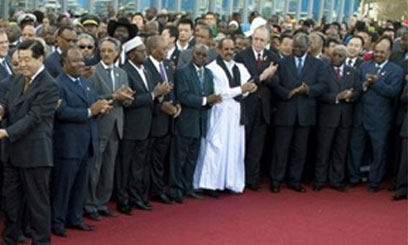 ADDIS ABABA, Jan 29 – President Mwai Kibaki was among African Union leaders who met Sunday for their first summit since the death of the bloc’s founder Muammar Gaddafi, with intense lobbying for its top jobs overshadowing the start of the talks.
ADDIS ABABA, Jan 29 – President Mwai Kibaki was among African Union leaders who met Sunday for their first summit since the death of the bloc’s founder Muammar Gaddafi, with intense lobbying for its top jobs overshadowing the start of the talks.
At the start of the two-day summit, which opened mid-morning, the leaders are choosing the next AU chairman to succeed Equatorial Guinea’s President Teodoro Obiang Nguema.
The AU chairmanship rotates among African leaders and is held for one year.
Late Sunday morning diplomatic sources said Benin President Thomas Boni Yayi was likely to be elected.
Two other names have circulated over the past week: Nigerian President Goodluck Jonathan and Gambian President Yahya Jammeh.
Obiang, summing up his year in office ahead of the summit, said he regretted that Africa today was “like a chess board where the nations and leaders are like pawns on the board… being manipulated by external powers.”
After a year that saw the AU faced with a post-election crisis in Ivory Coast as well as the Arab Spring revolutions, he said African leaders need to adopt a common front.
“We need a situation where African leaders are much more united and show solidarity to deal with the interference from external powers, and deal with the problems facing the continent,” Obiang told reporters in Kampala.
On Monday, the 18th ordinary summit will also chose the next head of the AU Commission, the 54-nation bloc’s executive arm, with South Africa’s Home Affairs Minister Nkosazana Dlamini-Zuma’s challenging incumbent Jean Ping.
South Africa said Saturday it was optimistic Dlamini-Zuma, former wife of President Jacob Zuma, can unseat Gabon’s Ping, who was first elected in 2008.
“Government remains optimistic that Minister Dlamini-Zuma will receive the necessary votes,” South Africa’s foreign ministry said in a statement.
No woman has held the AU Commission post. The election by secret ballot will be held on Monday.
Sources close to Ping say he is confident of re-election, counting on support from French-speaking West and Central Africa countries.
But Dlamini-Zuma, 62, has launched a tough campaign and has the backing of the 15-member Southern African Development Community.
Pretoria has been lobbying hard across the continent to drum up support to win the two thirds of the vote needed.
The summit, being held at sleek new Chinese-built AU headquarters inaugurated Saturday, and attended by UN Secretary General Ban Ki-moon, will also focus on boosting “Intra-African Trade.”
“Growth on the continent has remained robust. Many observers consider that Africa is on the verge of economic take-off. However we are only at the beginning,” Ping told the opening, adding that the AU should “speed up the economic integration in the continent. African countries do not trade enough among themselves.”
Trade between African states currently stands at 10 percent. In comparison, 40 percent of North America’s trade is with regional partners and the rate soars to 63 percent in western Europe.
Poor infrastructure, especially roads and railways, tariff barriers, reliance on exporting unprocessed goods and a lack of product diversification are some of the obstacles to trade within the continent.
The African leaders will also discuss the long-running conflict in Somalia, where the AU has a 10,000-strong force protecting the country’s fragile Western-backed government from the Al-Qaeda-linked Shebab militia.
Regions of war-torn Somalia remains in the grip of a dire famine, but Ping said he was optimistic for the future.
“Never before have the prospects of peace in Somalia appeared so real,” Ping told the opening ceremony.
Insecurity in the Sahel region, where Al-Qaeda linked fighters also operate in several countries, will also be in the focus.
A bitter dispute between Sudan and South Sudan over oil pipeline transit fees, heightening tensions between the former civil war enemies, is also hoped to be addressed in sideline talks.
Ping in his opening speech urged the two parties to reach a deal.
“Sudan and South Sudan… should in the supporting interest of the people conclude in earnest the negotiations on the post-cessation arrangements,” he said.









































